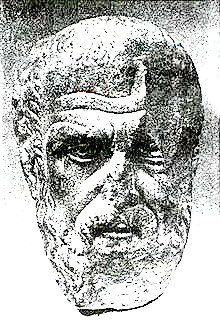Arrian
| Arrian Lucius Flavius Arrianus |
|
|---|---|

Bust of Arrian
|
|
| Born |
c. 86 Nicomedia, Bithynia, Anatolia |
| Died |
c. 160 Athens |
| Occupation | Historian, public servant, military commander and philosopher |
Arrian of Nicomedia (c. 86/89 – c. after 146/160 AD;/ˈæriən/; Latin: Lucius Flavius Arrianus, possibly Lucius Flavius Arrianus Xenophon;Greek Ἀρριανός Arrianos) was a Greek historian, public servant, military commander and philosopher of the Roman period.
The Anabasis of Alexander by Arrian is considered the best source on the campaigns of Alexander the Great. However, more recently even though modern scholars have generally preferred Arrian to other extant primary sources this attitude towards Arrian is beginning to change in the light of studies into Arrian's method.
Arrian was born in Nicomedia (present-day İzmit), the provincial capital of Bithynia, Dio called him Flavius Arrianus Nicomediansis. In respect of his birth date, sources provide similar dates for his birth; within a few years prior to 90, 89, and 85–90 AD. The line of reasoning for dates belonging to 85-90 AD is from the fact of Arrian being made a consul around 130 AD, and the usual age for this, during this period, being forty-two years of age. (ref. p. 312, & SYME 1958, same page).His family was from the provincial aristocracy of Greek stock, and his full name, L. Flavius Arrianus, indicates that he was a Roman citizen, suggesting that the citizenship went back several generations, probably to the time of the Roman conquest some 170 years before.
Sometime during the 2nd century AD (117 to 120 AD) while in Epirus, probably Nicopolis, Arrian attended lectures of Epictetus of Nicopolis, and proceeded within a time to fall into pupillage of him, a fact attested to by Lucian. All that is known about the life of Epictetus is due to Arrian, in that Arrian left a Encheiridion (Handbook) of Epictetus' philosophy. After Epirus he went to Athens, while there he became known as the young Xenophon, as a consequence of the similarity of his relation to Epictetus as Xenophon had to Socrates.
...
Wikipedia
